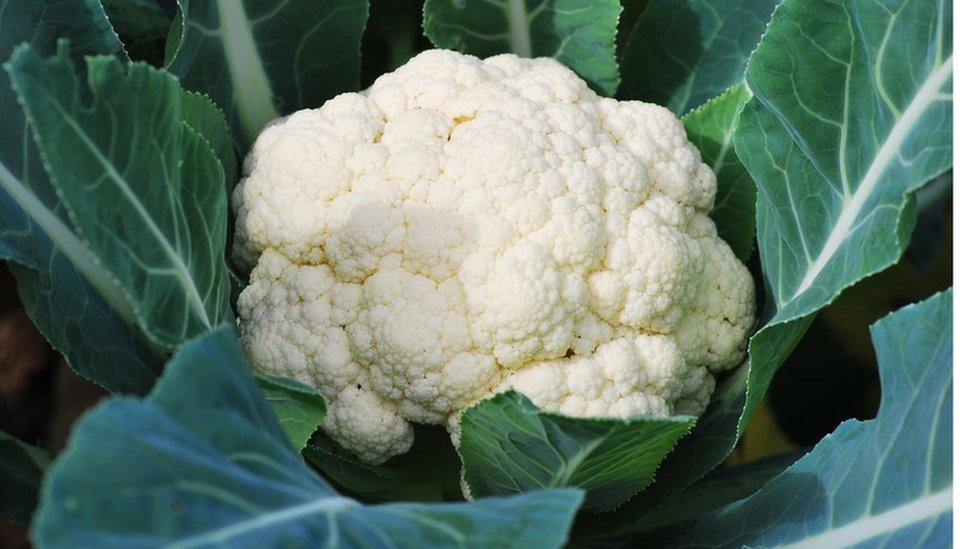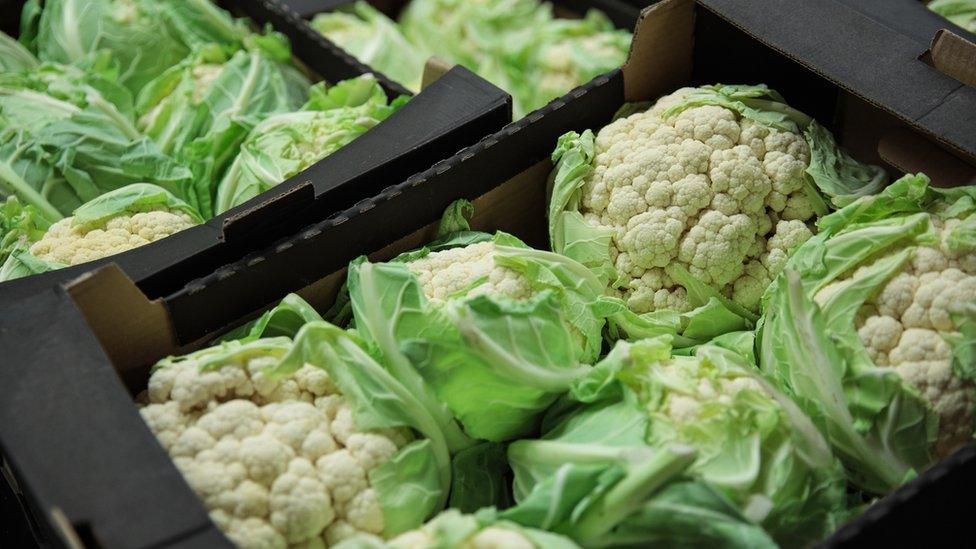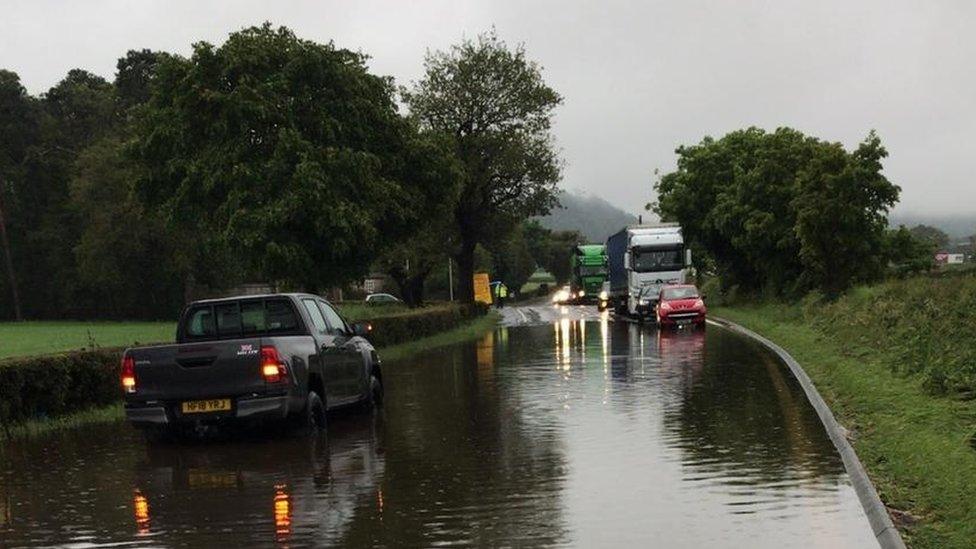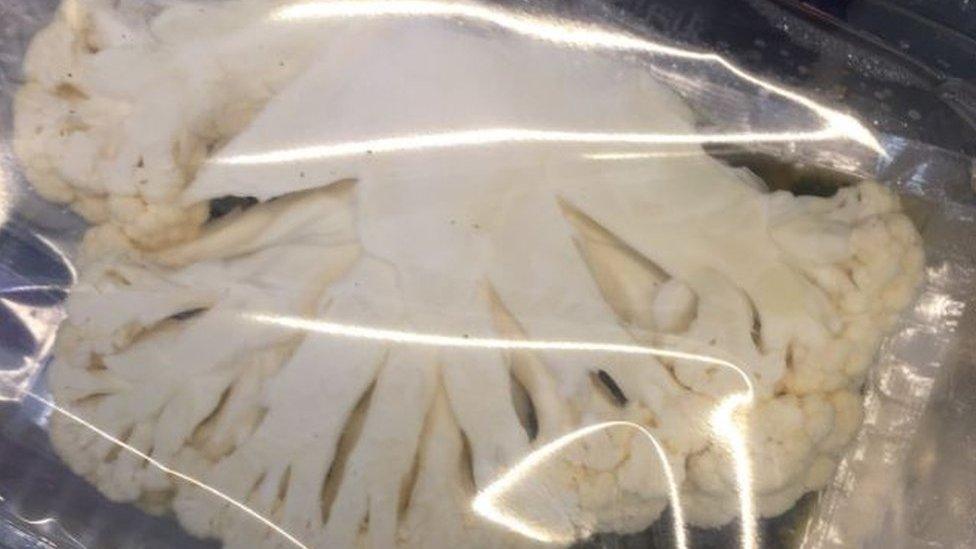Cauliflower shortages as extreme weather kills crops
- Published

Britain is experiencing a cauliflower shortage after extreme weather killed off much of this year's crops.
Heavy rainfall in June destroyed crops in Lincolnshire, and alternative European supplies wilted in last month's heatwave.
Cauliflower prices have soared and some farmers have suffered financial losses after the destruction of their crops.
The shortages were described as "very concerning" by a spokesman for the Brassica Growers Association.
Other brassica - including cabbage, broccoli and Brussels sprouts - are also in short supply.
"Crops can withstand a reasonable amount of variation in weather but the conditions in June were too much and as a result crops have suffered, and this is leading to a shortage of supply," the British Growers Association (BGA) said.
Most of the UK's cauliflowers are grown in Lincolnshire, which experienced record amounts of rainfall and flooding in June that destroyed this year's crop.
It has forced some suppliers to buy their cauliflowers from other countries - and the scarcity of them has caused prices to rise.
Some have advised customers - including restaurants and hotels - to take cauliflowers off their menus until stocks recover.
Kate Nicholls, chief executive of the trade body UK Hospitality, said: "If restaurants are unable to get their hands on cauliflower, that is obviously going to cause a nuisance.
"Thankfully, most should be fairly adept at substituting cauliflower for other items on their menus, so, hopefully, customers should not be unduly disappointed."

Steve Short, the managing director of Accent Fresh, a Norfolk-based fresh produce supplier, said: "We rely quite heavily on Lincolnshire for our brassica, and we get some from Cambridgeshire, Kent, Evesham [in Worcestershire], and Cornwall.
"We have had to import them from Holland during the shortages. The growers have lost a lot of crop, so the market is very short and the price has gone up.
"We've been paying between £1.50 and £2.00 per head of cauliflower, it would normally be about 50 or 60 pence each."

The rise of 'cauli-power'
Once regarded as a bland, boiled side dish, the cauliflower has risen in popularity as a substitute for everything from pizza crusts to gnocchi.
Broccoli's paler cousin has become a firm fixture on upmarket restaurant menus - think Yotam Ottolenghi's cumin-roasted cauliflower with tahini, zhoug and barberries or Heston Bluementhal's roasted cauliflower with smoked brown butter, red wine and truffle.
It is also beloved by celebrity chefs like Deliciously Ella, whose plant-based recipes include everything from creamy cauliflower and lentil dahl, to a cauliflower crust pizza and a mushroom, cauliflower and squash risotto.
Allow Instagram content?
This article contains content provided by Instagram. We ask for your permission before anything is loaded, as they may be using cookies and other technologies. You may want to read Meta’s Instagram cookie policy, external and privacy policy, external before accepting. To view this content choose ‘accept and continue’.

Cauliflower is also a popular alternative for those looking to reduce their meat intake: a hashtag devoted to cauliflower "steaks" has more than 11,000 posts on Instagram.
Get some creative cauliflower inspiration from the BBC's recipes, here.

Mr Short said the firm, which supplies about 300 hotels, restaurants, schools, universities and catering establishments across East Anglia, has advised customers to use other well-supplied vegetables, such as carrots and Swede, during the shortages.
The poor quality of some of the limited amount of British brassica has seen the firm give out credits to some of its customers, Mr Short said.
Martin Tate, commercial director of brassica growers Lincolnshire Field Products, estimated the farm has suffered about £1m in lost revenues after heavy rainfall decimated his cauliflower and broccoli crops.
He said: "We effectively had three months of rain in the space of three days, so anything that was planted up until that point in time [including the cauliflowers and broccoli] was either washed out of the ground, or sat for several weeks in flooded fields."
Brussels sprouts and red and white cabbage were also planted before the rains, but it is the cauliflowers and broccoli that have been worst hit in July and August.
He said the Brussels sprouts and the cabbages will be affected for the autumn and the winter, but it is too early to estimate the scale of the losses.
The farm's cauliflowers are now "suffering to a fairly huge degree", with just 20% of the crop able to be harvested, and with a percentage of what is being harvested not being of suitable quality to cover our orders.
"We have lost up to 80% of our production for the last two to three weeks and the next three weeks, so a large chunk of our season we're suffering not only crop losses but financial losses as well. Incomes are down and it's going to take a lot of recovering."
Lincolnshire Field Products supplies most of the UK's major retailers, and food companies that supply to pubs and restaurants.
Mr Tate expects the broccoli and cauliflower shortages to recover between the end of the month and the beginning of September.
'Disruption will be temporary'
Waitrose, Asda, and Morrisons have a range of cauliflower heads currently available for sale on their websites.
Both Tesco and Sainsbury's currently only have organic cauliflower heads for sale on their websites.
They are priced at £2 each - £1 more expensive than their standard cauliflowers.
The British Retail Consortium said: "This is yet another example of how retailers are having to manage the effects of climate change, which has created a greater variability in the weather and resulted a slightly poorer harvest in the UK."
- Published19 June 2019

- Published10 January 2018
